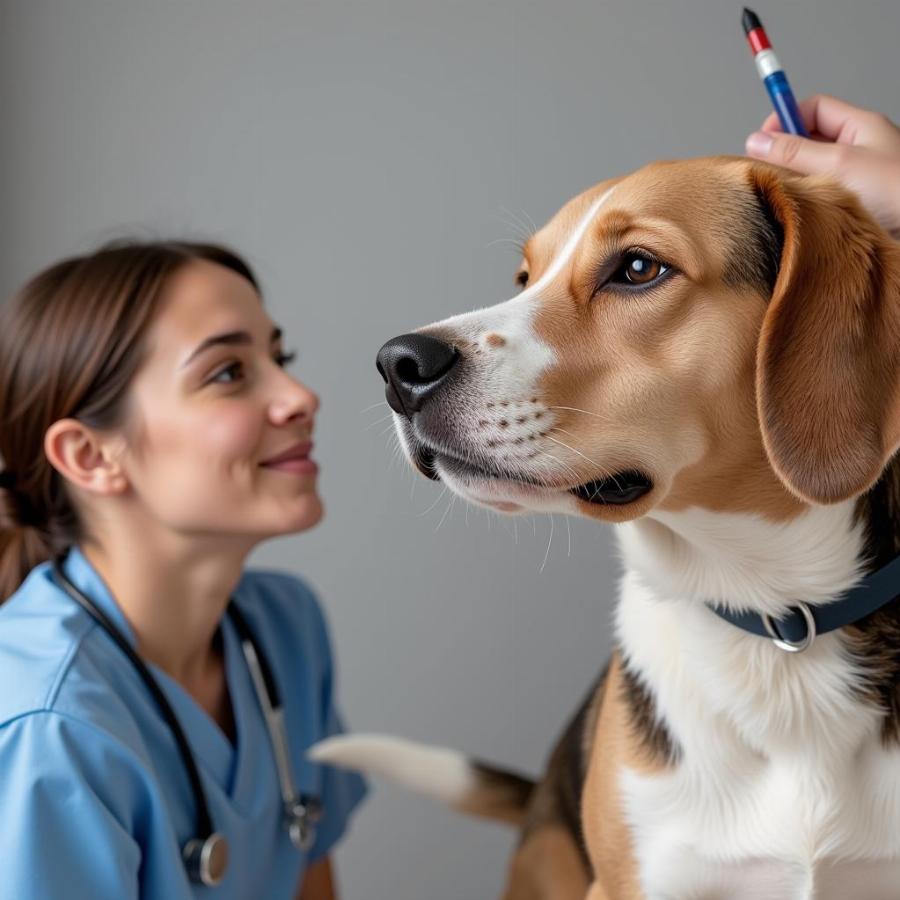If you’ve ever had a scratchy throat, you know how relieving a cough drop can be. But what about our furry friends? When your dog develops a cough, it’s natural to wonder if those same cough drops could help them too. However, before you pop one in their mouth, it’s crucial to understand the differences between human and canine medicine. This comprehensive guide will explore the safety and effectiveness of dog cough drops, alternative remedies, and when to seek veterinary care for your coughing companion.
Can I Give My Dog Cough Drops?
The short answer is no, you should never give your dog human cough drops. While some ingredients might seem harmless, many over-the-counter cough drops contain substances that are toxic to dogs, such as:
- Xylitol: This artificial sweetener is commonly found in sugar-free cough drops and can cause a rapid drop in blood sugar, leading to life-threatening complications in dogs.
- Menthol: This ingredient provides a cooling sensation in humans but can cause digestive upset, drooling, and vomiting in dogs.
- Essential Oils: Certain essential oils like eucalyptus and peppermint, often found in cough drops for their soothing properties, can be toxic to dogs even in small amounts.
Giving your dog human medications without consulting your veterinarian is extremely risky and potentially fatal.
Understanding Your Dog’s Cough
Before considering any remedies, it’s essential to understand the underlying cause of your dog’s cough. A cough is a reflex that helps clear the airways, and it can be triggered by various factors, including:
- Kennel cough: This highly contagious respiratory infection is a common culprit behind dog coughs, often accompanied by a honking sound.
- Canine influenza: Like humans, dogs can get the flu, leading to coughing, sneezing, and lethargy.
- Allergies: Just like us, dogs can suffer from allergies to pollen, dust mites, and mold, leading to coughing and respiratory irritation.
- Heart disease: A persistent cough, especially at night or during rest, can be a sign of underlying heart conditions in dogs.
- Collapsed trachea: This condition, more common in smaller breeds, can cause a chronic, goose-honk-like cough.
What to Do If Your Dog Has a Cough
If your dog develops a cough, it’s essential to contact your veterinarian for a proper diagnosis and treatment plan. Here’s what you can expect during your vet visit:
- Physical exam: Your vet will listen to your dog’s heart and lungs and check for any other signs of illness.
- History: Be prepared to answer questions about the duration and characteristics of your dog’s cough, as well as any other symptoms.
- Diagnostic tests: Depending on the suspected cause, your vet might recommend blood tests, X-rays, or other diagnostic procedures.
Safe Cough Relief for Dogs
While human cough drops are off-limits, there are safe and effective ways to soothe your dog’s cough and provide relief:
- Honey: A natural cough suppressant, honey can help soothe irritated throats. Offer your dog a teaspoon of raw honey mixed into their food or water a few times a day.
- Humidifier: Dry air can worsen coughs. Consider using a humidifier, especially during dry winter months, to add moisture to the air.
- Elevated Food and Water Bowls: This can be particularly helpful for dogs with a collapsed trachea, making it easier for them to swallow without putting pressure on their airway.
- Rest: Just like humans, dogs need rest to recover from illnesses. Ensure your dog gets plenty of sleep and avoids strenuous activity.
When to Seek Immediate Veterinary Attention
While most coughs are treatable, certain symptoms warrant immediate veterinary care. Contact your veterinarian immediately if your dog’s cough is accompanied by:
- Difficulty breathing or rapid breathing
- Blue-tinged gums or tongue
- Loss of appetite or lethargy
- Coughing up blood
- Wheezing or gasping for air
These could be signs of a serious medical condition requiring immediate attention.
FAQs About Dog Coughs
Q: Can I give my dog cough medicine for humans?
A: No, absolutely not. Never give your dog any medication intended for humans without consulting your veterinarian. Many human medications, including cough syrups, contain ingredients that are toxic to dogs.
Q: Can a dog cough be a sign of something serious?
A: Yes, a dog cough can sometimes indicate a serious underlying health issue such as heart disease, collapsed trachea, or even cancer. If your dog’s cough persists, worsens, or is accompanied by other symptoms, it’s crucial to seek veterinary care promptly.
Q: How can I prevent my dog from getting kennel cough?
A: The best way to protect your dog from kennel cough is through vaccination. Keep your dog’s vaccinations up-to-date, and avoid contact with sick dogs, especially in kennels or dog parks.
 Dog Receiving Kennel Cough Vaccination
Dog Receiving Kennel Cough Vaccination
Beaut Dogs: Your Trusted Source for Canine Care
Beaut Dogs is your go-to resource for all things related to dog health and well-being. From understanding common ailments like coughs to providing expert advice on nutrition, training, and more, we’re here to help you navigate the wonderful world of dog ownership. For personalized guidance and support, feel free to reach out to us at [email protected].